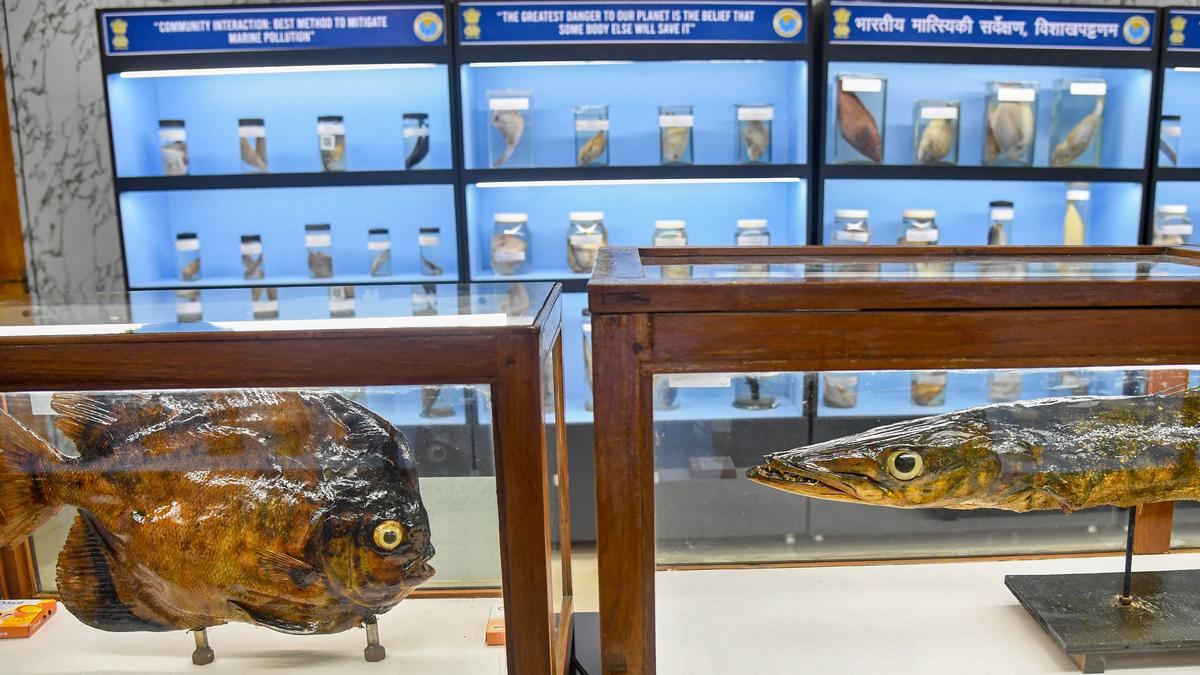
Now, scan QR code to know about specimens at renovated marine museum in Visakhapatnam
The Hindu
Explore the renovated marine museum at FSI Visakhapatnam with QR codes for interactive learning about marine life.
The renovated marine museum at the Fisheries Survey of India, Visakhapatnam Zonal base, here, is a boon to students, researchers and general public, interested in knowing more about marine life. The FSI has taken painstaking efforts in developing a QR code for many of the exhibits on display.
A couple of years ago, students and fishery enthusiasts used to go around the exhibits on display at the marine exhibition, which used to be conducted as part of the annual Open House, organised by the FSI, Visakhapatnam, every year.
The students had to carry pen and paper to jot down the little details available on the exhibits and those given by the staff regarding the specimens on display. That was a thing of the past. All that the visitors, wishing to know about the species on display, have to carry is their smartphone.
“QR coding is being done for all the specimens in the renovated museum for the benefit of students and visitors. On scanning the code on their mobile phones, visitors can get complete history of the specimen,” says D. Bhami Reddy, Head of FSI, Vizag.
The renovated museum has around 250 specimens, preserved and displayed neatly in a solution of formalin and water in glass jars. The QR codes have been given to over 100 exhibits on display and the remaining are expected to be completed soon.
There are a few large varieties like the 2-metre-long sea cow, 1-m-long commercial fish baraciuda and an equally long sickle fish, which are stuffed with cotton and stored in glass jars.
The rare and exotic species include molluscs, gurnads, caught in the waters off Andaman and Nicobar Islands, spider crab, caught in the same area, a crocodile shark, which is found in the deep sea, a ‘white sea horse’, a ‘horse shoe crab’, found in the Odisha coast, and a lobster from Andaman Islands have also been preserved in the museum.

“Writing, in general, is a very solitary process,” says Yauvanika Chopra, Associate Director at The New India Foundation (NIF), which, earlier this year, announced the 12th edition of its NIF Book Fellowships for research and scholarship about Indian history after Independence. While authors, in general, are built for it, it can still get very lonely, says Chopra, pointing out that the fellowship’s community support is as valuable as the monetary benefits it offers. “There is a solid community of NIF fellows, trustees, language experts, jury members, all of whom are incredibly competent,” she says. “They really help make authors feel supported from manuscript to publication, so you never feel like you’re struggling through isolation.”

Several principals of government and private schools in Delhi on Tuesday said the Directorate of Education (DoE) circular from a day earlier, directing schools to conduct classes in ‘hybrid’ mode, had caused confusion regarding day-to-day operations as they did not know how many students would return to school from Wednesday and how would teachers instruct in two modes — online and in person — at once. The DoE circular on Monday had also stated that the option to “exercise online mode of education, wherever available, shall vest with the students and their guardians”. Several schoolteachers also expressed confusion regarding the DoE order. A government schoolteacher said he was unsure of how to cope with the resumption of physical classes, given that the order directing government offices to ensure that 50% of the employees work from home is still in place. On Monday, the Commission for Air Quality Management in the National Capital Region and Adjoining Areas (CAQM) had, on the orders of the Supreme Court, directed schools in Delhi-NCR to shift classes to the hybrid mode, following which the DoE had issued the circular. The court had urged the Centre’s pollution watchdog to consider restarting physical classes due to many students missing out on the mid-day meals and lacking the necessary means to attend classes online. The CAQM had, on November 20, asked schools in Delhi-NCR to shift to the online mode of teaching.









